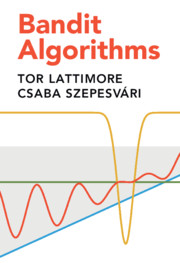Refine search
Actions for selected content:
1550 results in Control systems and optimization
1 - Introduction
- from Part I - Bandits, Probability and Concentration
-
- Book:
- Bandit Algorithms
- Published online:
- 04 July 2020
- Print publication:
- 16 July 2020, pp 3-11
-
- Chapter
- Export citation
Index
-
- Book:
- Bandit Algorithms
- Published online:
- 04 July 2020
- Print publication:
- 16 July 2020, pp 513-518
-
- Chapter
- Export citation
31 - Non-stationary Bandits
- from Part VII - Other Topics
-
- Book:
- Bandit Algorithms
- Published online:
- 04 July 2020
- Print publication:
- 16 July 2020, pp 331-339
-
- Chapter
- Export citation

Bandit Algorithms
-
- Published online:
- 04 July 2020
- Print publication:
- 16 July 2020
Part III - Frictional Rigid-Body Grasps and Stances
-
- Book:
- The Mechanics of Robot Grasping
- Published online:
- 03 October 2019
- Print publication:
- 24 October 2019, pp 299-300
-
- Chapter
- Export citation
1 - Introduction and Overview
-
- Book:
- The Mechanics of Robot Grasping
- Published online:
- 03 October 2019
- Print publication:
- 24 October 2019, pp 1-14
-
- Chapter
- Export citation
8 - Second-Order Immobilizing Grasps
- from Part II - Frictionless Rigid-Body Grasps and Stances
-
- Book:
- The Mechanics of Robot Grasping
- Published online:
- 03 October 2019
- Print publication:
- 24 October 2019, pp 167-193
-
- Chapter
- Export citation
4 - Rigid-Body Equilibrium Grasps
- from Part I - Basic Geometry of the Grasping Process
-
- Book:
- The Mechanics of Robot Grasping
- Published online:
- 03 October 2019
- Print publication:
- 24 October 2019, pp 54-80
-
- Chapter
- Export citation
Part I - Basic Geometry of the Grasping Process
-
- Book:
- The Mechanics of Robot Grasping
- Published online:
- 03 October 2019
- Print publication:
- 24 October 2019, pp 15-16
-
- Chapter
- Export citation
12 - Wrench-Resistant Grasps
- from Part III - Frictional Rigid-Body Grasps and Stances
-
- Book:
- The Mechanics of Robot Grasping
- Published online:
- 03 October 2019
- Print publication:
- 24 October 2019, pp 301-320
-
- Chapter
- Export citation
13 - Grasp Quality Functions
- from Part III - Frictional Rigid-Body Grasps and Stances
-
- Book:
- The Mechanics of Robot Grasping
- Published online:
- 03 October 2019
- Print publication:
- 24 October 2019, pp 321-348
-
- Chapter
- Export citation
9 - Minimal Immobilizing Grasps
- from Part II - Frictionless Rigid-Body Grasps and Stances
-
- Book:
- The Mechanics of Robot Grasping
- Published online:
- 03 October 2019
- Print publication:
- 24 October 2019, pp 194-231
-
- Chapter
- Export citation
2 - Rigid-Body Configuration Space
- from Part I - Basic Geometry of the Grasping Process
-
- Book:
- The Mechanics of Robot Grasping
- Published online:
- 03 October 2019
- Print publication:
- 24 October 2019, pp 17-37
-
- Chapter
- Export citation
Appendix B - Summary of Stratified Morse Theory
-
- Book:
- The Mechanics of Robot Grasping
- Published online:
- 03 October 2019
- Print publication:
- 24 October 2019, pp 486-492
-
- Chapter
- Export citation
14 - Hand-Supported Stances under Gravity – Part I
- from Part III - Frictional Rigid-Body Grasps and Stances
-
- Book:
- The Mechanics of Robot Grasping
- Published online:
- 03 October 2019
- Print publication:
- 24 October 2019, pp 349-370
-
- Chapter
- Export citation
6 - Introduction to Secure Grasps
- from Part II - Frictionless Rigid-Body Grasps and Stances
-
- Book:
- The Mechanics of Robot Grasping
- Published online:
- 03 October 2019
- Print publication:
- 24 October 2019, pp 135-146
-
- Chapter
- Export citation
Frontmatter
-
- Book:
- The Mechanics of Robot Grasping
- Published online:
- 03 October 2019
- Print publication:
- 24 October 2019, pp i-iv
-
- Chapter
- Export citation
Part IV - Grasping Mechanisms
-
- Book:
- The Mechanics of Robot Grasping
- Published online:
- 03 October 2019
- Print publication:
- 24 October 2019, pp 409-410
-
- Chapter
- Export citation
10 - Multi-Finger Caging Grasps
- from Part II - Frictionless Rigid-Body Grasps and Stances
-
- Book:
- The Mechanics of Robot Grasping
- Published online:
- 03 October 2019
- Print publication:
- 24 October 2019, pp 232-255
-
- Chapter
- Export citation
Index
-
- Book:
- The Mechanics of Robot Grasping
- Published online:
- 03 October 2019
- Print publication:
- 24 October 2019, pp 493-498
-
- Chapter
- Export citation
